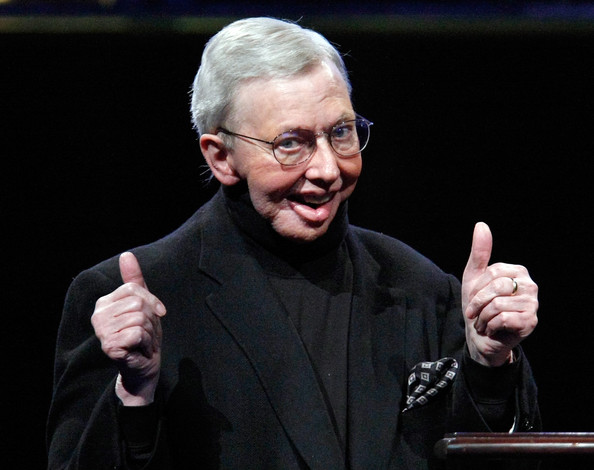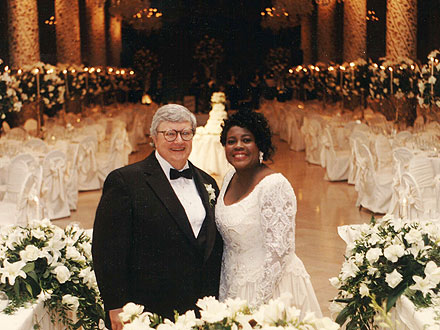| 1942-2013 |
I always considered Roger Ebert the Dean of Film Criticism, the one whom all of us who write about film, either in print or online, looked to as a model of what a great film critic should be. Again and again I am loath to call myself a film critic; the term implies that I seek out things to dislike, that I take a negative view of film in general. I believe that film reviewer (giving my views of the film in question and what worked and/or didn't for me as a viewer) is closer to the truth, and I think it applied to Ebert. Neither of us would say we go into a movie to hate it. Rather, we wish to find something wonderful, or entertaining, or intelligent, and just wanted to tell the world about it.
More than anything, Roger Ebert loved film. He loved all kinds of films: foreign-language, silent, documentaries, as well as popular fare. He was as enthusiastic about The Hangover as he was about Vertigo. Ebert popularized those films that might have been seen as a bit too avant-garde, too artistic, too out-of-the-mainstream for the general public. He (like myself) believe that in terms of movies, we should not be afraid of the dark.
In short, he followed the maxim that there are two kinds of film: good films and bad films. His enthusiasm or condemnation of a film was expressed clearly and directly, all things we who write about film attempt to do. He put great intelligence to his reviews, stating his case. Sometimes his case didn't hold, but however that famous thumb went, you knew this is how Roger Ebert felt, without subterfuge or arrogance.
We who write film criticism all owe a debt to Roger Ebert. We stand in his shadow. His convictions on a film (whether to love or loath it), was spoken straight from the heart and without fear of whether it met with approval. Some of my fellow film critics sadly are what are dubbed 'quote whores': people who for a good meal or trinkets might give praise to bad films, whose comments will then be used to promote the film as good. Ebert was not like that. When he loved something he loved it, when he hated it he did not mince words. How he felt is how he put it on the page or spoke it on the screen. He was unbought and unbossed.
When he became ill with cancer, he did not hide from it or its effects. Instead, Ebert kept going, determined not to be silent. The voice was gone, but the fingers could still fly across the keyboard, the mind was still sharp, and the eyes could still see the beauty and the garbage that is thrown at us. Ebert refused to let cancer slow him down, let alone stop him. He was limited in what he could do but he kept at it. That is what I call courage: facing serious illness, acknowledging it, and continuing to live despite it.
I did not always agree with Ebert in terms of films and politics. Sometimes I thought him mad. However, few of us who write on film, argue about films, champion certain movies or condemn others, would be here without the powerful influence of Roger Ebert. He was THE film critic that most of us grew up with and the one we would attempt to immolate in some way or other. His love for movies and his desire to bring a wider perspective to audiences to think of movies not just as entertainment or even art but as something to bring pleasure to life itself will be one of his great legacies. He used his voice to speak his mind about movies, and now thanks to him, all of us who write about film are proud to follow his example.
We Film Critics/Reviewers owe so much to Roger Ebert. He was our guide, our unacknowledged mentor, our role model, and for a brief time and in the thinnest of ways, he was a colleague. It's a safe bet most of us Film Critics/Reviewers would not be here without him.
Thank you, Mr. Ebert.
My condolences to his wife Chaz and his family.
The Balcony will now be a little lonelier...
IN MEMORIAM


No comments:
Post a Comment
Views are always welcome, but I would ask that no vulgarity be used. Any posts that contain foul language or are bigoted in any way will not be posted.
Thank you.